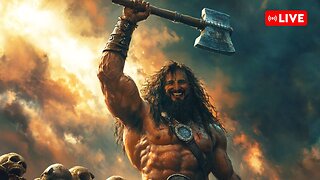Premium Only Content

The era of mass media is over
Happy 4th of July!!
Bo Sacks distributed an article by Peter Bale titled, "New book by Jeff Jarvis uses lessons from media’s print history to frame the digital future." It reminded me of a rather cynical communist I used to work with who said, "Freedom of the press, for everyone who can afford a press."
Jarvis says the era of mass media is over, and he gives several reasons.
There's no need for big, capital-intensive investments, whether in printing plants, TV studios, or distribution networks. All those things have been disrupted.
We no longer need typing pools. Layout is getting easier all the time, and AI will continue to make it even easier, lowering the cost of entry into the market.
Capital-intensive investments required scale. The new media landscape is very different. Desktop publishing brought about a surge in newsletter publishers, the internet allowed for blogs and digital publications, and AI is going to allow individual creators to have their own studios.
Does Megyn Kelly or Tucker Carlson even need Fox News?
The path forward, Jarvis says, is to rethink the value proposition and what service you are offering.
I agree with that. Free commerce means people pay for things they want.
He also says we need to stop thinking of the public as audience and start thinking of them as participant.
At first that reminded me of the old 1970s nonsense about "everybody has something valuable to contribute." Whoever said that hasn't met everybody. Some people are morons.
But that's not what he's saying. He's contrasting the mass-produced widget (or content) that's supposed to work for everybody with the personalized widget (or content) that does exactly what somebody needs.
Jarvis says "we have to return to a time when we take individual responsibility for the credibility of what we read." I don't know when that time was -- content has always been curated -- but even if there was such a time, I don't think that's practical. We need reliable editors. Curators.
He says “We delegated that responsibility to institutions that came along of editing and publishing a newspaper.”
And yes, the institutions have proven to be garbage. But we'll still need trusted people to vet things for us. I simply don't have time to chase down the truth on every issue that interests me.
As you might expect, he seems pretty down on print, and he has to be to make his case. We may not need huge newspapers any more, but creating a glossy magazine still requires some instrastructure, and people still like magazines, no matter what the tech boys tell you.
We are definitely in a transition from print, through print plus digital, into something else, and Jarvis is one of the people who’s thinking ahead about those things.
Resources
New book by Jeff Jarvis uses lessons from media’s print history to frame the digital future
https://www.inma.org/blogs/newsroom-initiative/post.cfm/new-book-by-jeff-jarvis-uses-lessons-from-media-s-print-history-to-frame-the-digital-future
-
 LIVE
LIVE
SpartakusLIVE
2 hours agoFriday NITE HYPE
6,683 watching -
 LIVE
LIVE
Mally_Mouse
22 hours agoFriend Friday!! 🎉 - Let's Play! - Microworks
233 watching -
 LIVE
LIVE
Quite Frankly
2 days agoHookah Special: Found Footage, Workplace Folly, More Cringe Music Vids (8/23/25 Re-Run)
256 watching -

AlaskanBallistics
18 hours agoNutrek Optics Coppertag 5-25x56mm Review
62 -
 LIVE
LIVE
SavageJayGatsby
18 hours agoFriend Friday | MicroWorks | $300 Weekly Goal for Spicy Bite Saturday | 250 Follower Goal!
47 watching -
 LIVE
LIVE
The Mike Schwartz Show
3 hours agoTHE MIKE SCHWARTZ SHOW Evening Edition with Guests Dr. PETER MCCULLOUGH and JOHN LEAKE
4,195 watching -
 1:01:41
1:01:41
BonginoReport
8 hours agoAI & The Woke Indoctrination Ruining Childhood - Nightly Scroll w/ Hayley Caronia (Ep.123)
28.8K11 -
 1:17:29
1:17:29
Kim Iversen
5 hours agoTrotskyite Neocons: How MARXISTS Built the Modern GOP
70.7K89 -
 DVR
DVR
StoneMountain64
4 hours ago#1 Battlefield Mastery Session with the BOYS
10K1 -
 1:23:45
1:23:45
Roseanne Barr
5 hours agoDeclassifying Presidential Sex Slavery W/ Cathy O’Brien | The Roseanne Barr Podcast #113
93.5K43